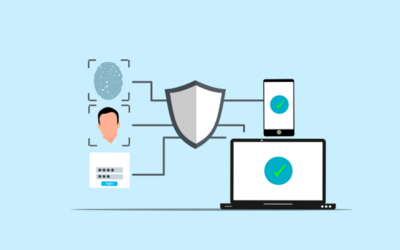
Cloud security is the protection of data stored online via cloud computing platforms. Reviewing the benefits and risks of cloud security can help organizations find the right cloud security approach to match their needs.
The Benefits of Cloud Services
Many small businesses, consumer industries, and health care environments have switched to cloud technology to store their data. The cloud offers numerous benefits over the traditional, physical on-site server. It is a great choice, especially for SMBs who don’t want the burden of higher in-house IT costs. Click here to learn more about Wahaya IT’s managed cloud services.
Reasons for switching to the cloud include:
Anytime, anywhere access to your data:
You can access information in the cloud from anywhere using an internet connection, unlike traditional servers where it needs a physical connection.
Significant cost savings:
Reduce hardware costs because you do not need to invest in physical hardware.
Shared storage leads to cost savings:
The Cloud lets you share space with others while maintaining a secure environment in general. It follows a pay-as-you-use approach to data storage, allowing you to enjoy cost savings based on your data storage needs. Traditional options require paying for and purchasing a whole new server if your data storage needs exceed the existing capacity.
SaaS compatibility and support:
Since the cloud can host the software, it allows software-as-a-Service.
Scalability:
The Cloud lets you scale up and down as your business needs change.
24/7 monitoring, support, and greater access reliability:
When your data is in the cloud, the Cloud service provider is responsible for keeping it safe and ensuring it is securely accessible at all times. Therefore, they monitor the cloud’s performance, and in the event of any performance issues, they provide immediate tech support to resolve the problem.
Organizations must protect consumer information to satisfy customers, but many must follow regulations for storing sensitive data. Common personal data stored that is protected by rules are credit card and healthcare information. In particular, healthcare providers must implement a cloud solution that is HIPAA compliant. Different environments will face unique privacy and security concerns.
Threats to Cloud Security
Putting your data in the cloud is not completely risk-free. Just as storing data on physical servers has its security threats, the cloud also presents certain security concerns. To protect your network, Wahaya IT offers a managed a layered approach to security. As a result, our system highlights cloud backups, continuous employee training, filtering, and AI-based malware learning. Our various levels of defense minimize the possibility of cyber threats slipping through. Major threats to cloud security include:
Data breach:
A data breach is when someone accesses your data and is not authorized to do so.
Data loss:
A data loss is a situation where you lose your data in the cloud due to certain circumstances, such as technological failure or neglect during any stage of data processing or storage.
Account hijacking:
Like traditional servers, hijackers could steal data in the cloud as well. Cloud account hijacking is predominant in cybercrimes that require identity thefts and wrongful impersonation.
Service traffic hijacking:
In a service traffic hijacking, your attacker first gains access to your credentials, uses it to understand the online activities in your domain, and then uses the information to mislead your users or domain visitors to malicious sites.
Insecure application program interfaces (APIs):
Sometimes, Cloud APIs, when opened up to third parties, can be a huge security threat. If the API keys are not properly secured, they can be an entry point for cybercriminals and malicious elements.
Poor Cloud storage providers:
A security lapse from the Cloud storage provider’s end is a huge security concern for businesses. Therefore, choosing a trusted and experienced Cloud service provider who knows what they are doing is very important.
Cloud Security Mechanisms
As part of a layered approach to cloud security, the implementation of several mechanisms happens to counter potential threats. These include:
Cloud firewalls:
Much like the firewalls you deploy for your local IT network, Cloud firewalls work to prevent unauthorized Cloud network access.
Penetration testing:
Penetration testing is a sort of a Cloud security check where IT experts try hacking into the Cloud network to figure out any security lapses or vulnerabilities that could serve cybercriminals.
Obfuscation:
In obfuscation, the data or program code becomes obscured on purpose. As a result, the system delivers unclear code to anyone other than the original programmer, thus mitigating any malicious activity.
Tokenization:
Tokenization is the process of replacing sensitive data with unique identification symbols. As a result, these symbols retain all the essential information about the data without compromising its security.
Virtual Private Networks (VPN):
Another, more commonly used mechanism is the VPN. VPN creates a safe passage for data over the cloud through end-to-end encryption methodology.
Investing in a good cloud security system is a must, especially when protecting private consumer data. Complete cloud security is a blend of all these multiple digital security layers plus internal policies, best practices, and regulations related to IT security.

































